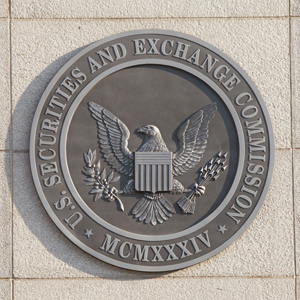Some trials by SEC administrative judges violate Seventh Amendment right to jury trial, 5th Circuit rules

The U.S. Securities and Exchange Commission headquarters.
A federal appeals court ruled Wednesday that administrative trials by the U.S. Securities and Exchange Commission violate the Seventh Amendment right to a jury trial when civil penalties are sought.
The 5th U.S. Circuit Court of Appeals at New Orleans ruled in a 2-1 decision that also found two other constitutional problems with the enforcement action.
The court said Congress unconstitutionally delegated legislative power to the SEC. And the court said the agency’s administrative law judges were appointed in violation of the take care clause because of statutory restrictions on their removal.
The court ruled in the case of hedge fund creator George R. Jarkesy Jr. and his investment adviser, Patriot28. They were accused of misrepresenting fund safeguards and overvaluing the funds’ assets to increase fees charged to investors.
An administrative law judge found that Jarkesy and Patriot28 committed securities fraud, and the commission affirmed. They were ordered to pay a civil penalty of $300,000, and Patriot28 was ordered to disgorge nearly $685,000 in ill-gotten gains.
The panel majority said Jarkesy and Patriot28 were entitled to a jury trial under the Seventh Amendment because the enforcement action against them is akin to traditional actions at law. Judge Jennifer Walker Elrod wrote the May 18 majority decision, Jarkesy v. Securities and Exchange Commission.
The 1977 U.S. Supreme Court case Atlas Roofing v. Occupational Safety & Health Review Commission allows Congress to assign cases to an agency for an initial adjudication when the government sues in its sovereign capacity to enforce public rights. But the rights at issue in the SEC enforcement case don’t concern public rights alone, the 5th Circuit said.
The civil penalty sought “suffices for the jury-trial right to apply,” the appeals court said. “Congress cannot convert any sort of action into a ‘public right’ simply by finding a public purpose for it and codifying it in federal statutory law.”
On the issue of legislative power, the appeals court said, Congress unconstitutionally delegated the power when it gave the SEC the “unfettered authority” to choose whether to bring enforcement actions within the agency or in federal court.
“Congress gave the SEC a significant legislative power by failing to provide it with an intelligible principle to guide its use,” the 5th Circuit said.
On the subject of removal restrictions, the appeals court cited the take care clause, which says the president must “take care that the laws be faithfully executed.” Under Supreme Court precedent, the provision guarantees the president a certain degree of control over executive officers.
The court noted that administrative law judges in the SEC can only be removed if good cause is found, and that SEC commissioners can only be removed by the president for good cause.
“Two layers of for-cause protection impede [presidential] control; Supreme Court precedent forbids such impediment,” the 5th Circuit said.
The Supreme Court agreed to consider another issue regarding the SEC on May 16. At issue in Cochran v. SEC is whether people targeted by the SEC have to complete an administrative appeals process before pursuing a constitutional challenge in federal court, according to Bloomberg Law.
In a prior case concerning the SEC, the Supreme Court ruled in June 2018 that administrative law judges at the SEC were officers of the United States under the appointments clause, and they must be appointed by the president, courts or the heads of federal agencies. Before that ruling, Lucia v. Securities and Exchange Commission, judges at the SEC were selected by the chief judge and approved by the SEC personnel office.
Jarkesy and Patriot28 had been offered a second hearing before a properly appointed administrative judge after Lucia was decided, but they turned it down.
Hat tip to @mjs_DC, @prof_jpc, the New York Times, Bloomberg Law and Reuters, which had news of the decision.
Write a letter to the editor, share a story tip or update, or report an error.


